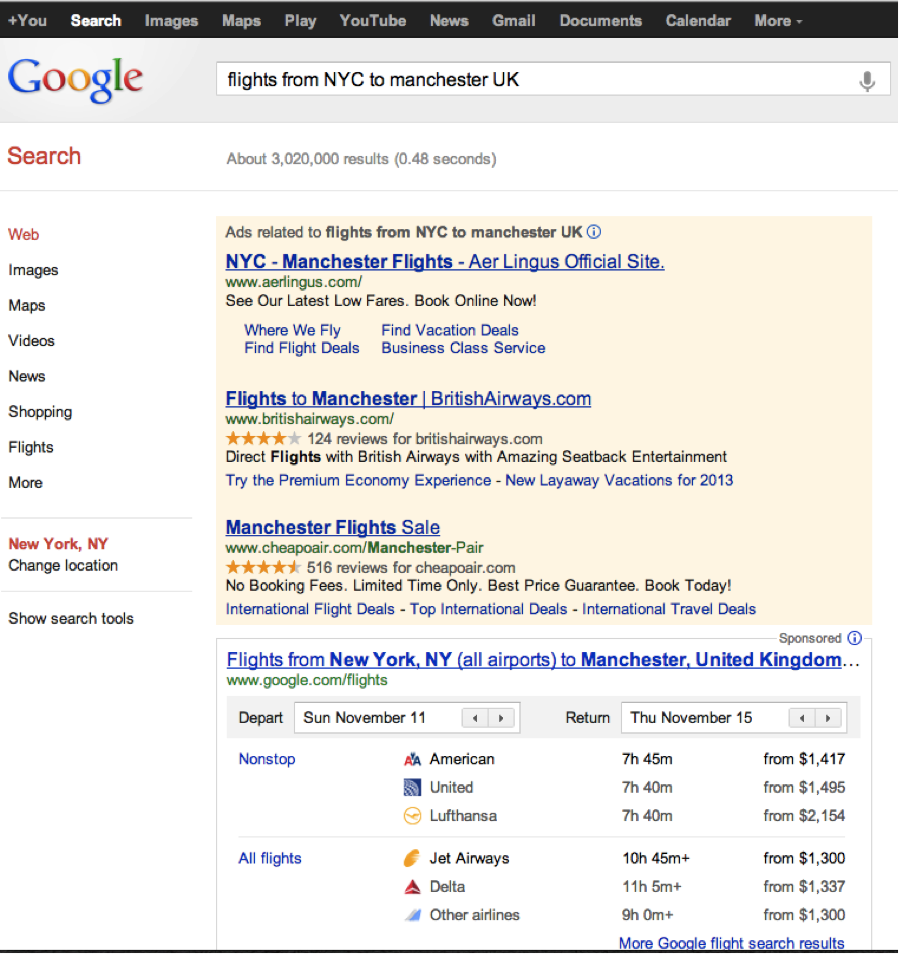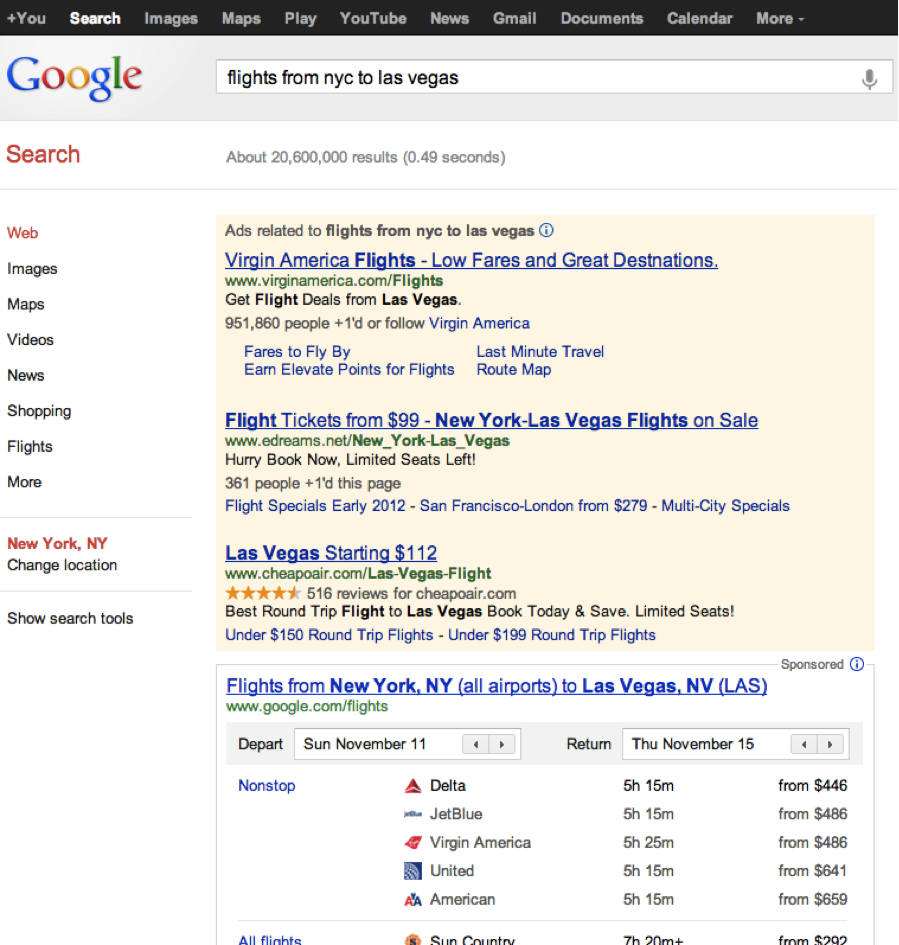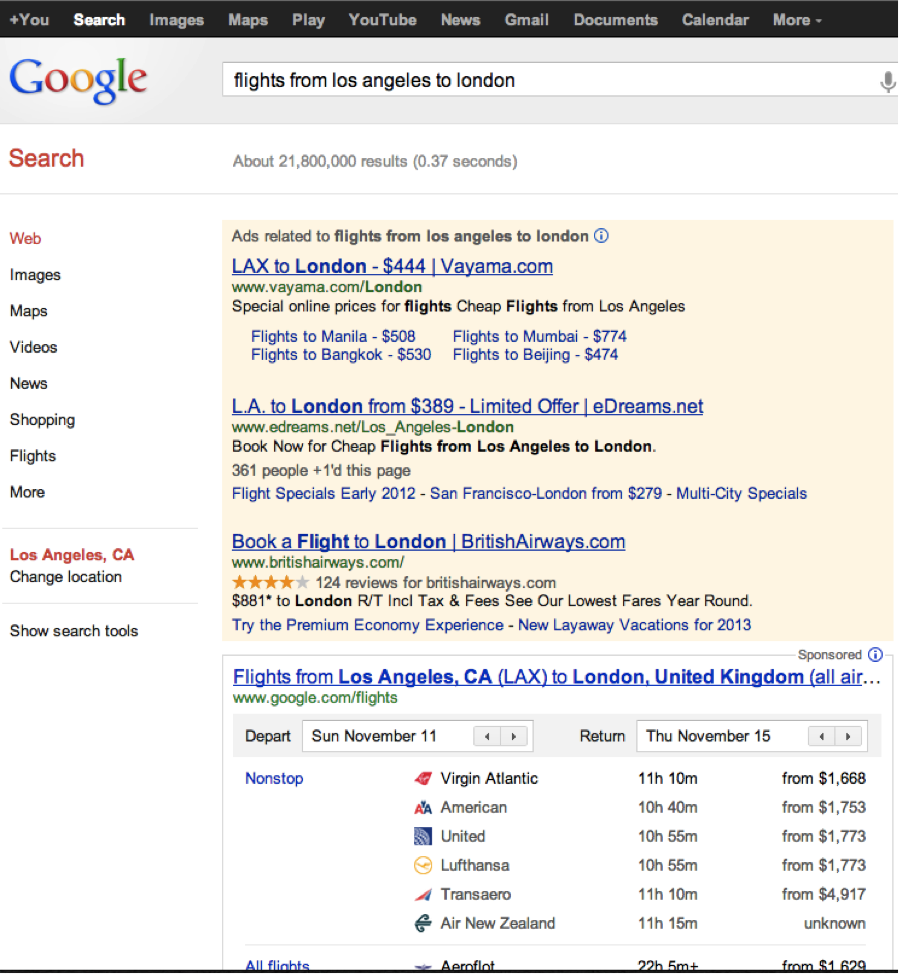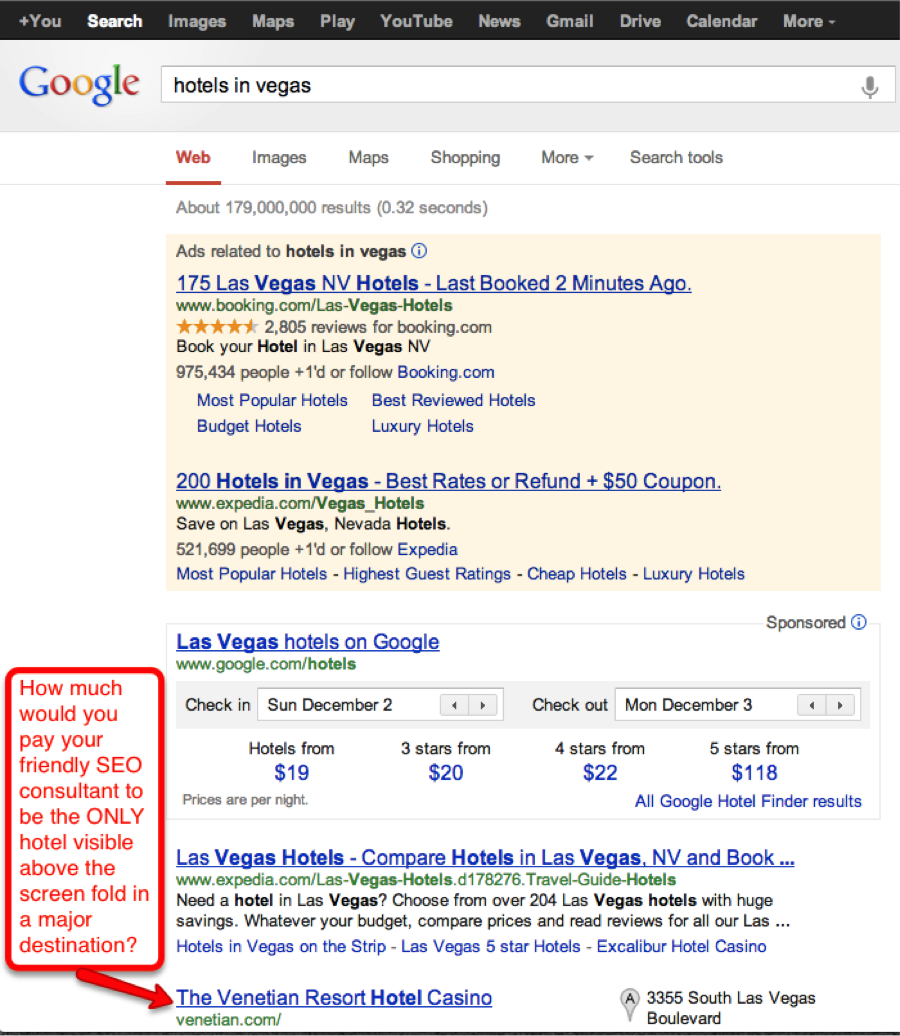 Back to Blogs
Back to Blogs
Google Travel and the Death of Travel SEO
It’s not just Panda, Penguin and the other charmingly named Google search releases that have stuck the knife in… It’s Google Travel’s helpful presentation of relevant information that’s killing your SEO and SEM arbitrage.
For a great many years, travel suppliers have fought for browser “shelf space” in two ways above all: paying Google for ads, and investing in SEO efforts. The Holy Grail for many has been to be in the top 3 natural search results, or if not then at least on the first page, perhaps supported by a cost effective ad placement on that same page.
Commercially, this has given rise to a veritable military-industrial complex of in-house SEO teams, consulting SEO advisers, and “friends of Matt Cutts” who could divine the likely impact of each prior and pending Google search release and give direction to the teeming masses, yearning to be first pagers (for the record, this writer once sat on a Google cafeteria chair where Matt had sat moments before, which means… nothing).
On the shadier side, the SEO military-industrial complex also gave rise to content mills, cross-linking and anchor text boiler rooms and all the grayer aspects of SEO arms trading. One of the most amusing outfits in this area promised great results in travel SEO and achieved this in part by blog posts about sex in Bali through the ages. It appears that “sex”, “sex in Bali” and the like have a fair amount of searches going against them. By linking every reference to travel, cheap tickets and hotel rooms to “sex in Bali” with a travel supplier’s URLs this had a positive SEO impact, however fleeting.
The party appears about to take a turn, though, and whether for the better it remains to be seen. All the years of SEO work and millions of dollars hiring third world teenagers to feature your URL as the hot link under “cheap flights” or “best hotels” in various blogs are at some risk.
This, by the way, might explain why some travel distributors, referral and deal sites that are critically dependent on a mix of SEO and SEM are beginning to see a nasty inflection point in their arbitrage costs and overall economics.
“Evidence, my dear Watson!” you might exclaim, and you’d be right. Here are a couple of flight searches and what appears ABOVE THE FOLD of a fully extended browser on a 1440x900 screen.
Maybe no one should want to go to Manchester, UK unless you’re a soccer fan, but behold, not a single line of old-school natural search results above the fold:
 Giving the benefit of many doubts, let’s try other more likely routes such as NYC to Vegas, and behold, no old school natural search results above the fold:
Giving the benefit of many doubts, let’s try other more likely routes such as NYC to Vegas, and behold, no old school natural search results above the fold:
 Hoping this might be just a domestic phenomenon? Try LAX to London. You guessed it, no old school natural search above the fold:
Hoping this might be just a domestic phenomenon? Try LAX to London. You guessed it, no old school natural search above the fold:
 Now to be fair, this does not happen in every route, and maybe the screen fold would be lower on Retina MacBook Pro…
And on behalf of our Google friends it would be fair to note that their “Sponsored” results were arguably as informative as old school natural search results. Still, we hear the bells and for whom they toll. As structured data with full semantics takes over Google pages, all those years, all those tears and all those fears (of Google discovering cheap travel to sex in Bali as anchor text for travel suppliers) seem to be fading out.
Or not, since arguably the value of good SEO work is now even greater. Knowing that so much of the first chunk of natural results gets shoved below the fold by Google ads and structured data, being among the first few is now not just bragging rights, but almost the whole game.
Take heart, “friends of Matt”, and fellow SEO aficionados: the clients that were investing to be somewhere on page one now need to invest even more to be above the screen fold. Suppliers and marketing execs: If Google products take up the first several inches, wouldn’t you value even more being the few visible links above the fold in the right markets?
Now to be fair, this does not happen in every route, and maybe the screen fold would be lower on Retina MacBook Pro…
And on behalf of our Google friends it would be fair to note that their “Sponsored” results were arguably as informative as old school natural search results. Still, we hear the bells and for whom they toll. As structured data with full semantics takes over Google pages, all those years, all those tears and all those fears (of Google discovering cheap travel to sex in Bali as anchor text for travel suppliers) seem to be fading out.
Or not, since arguably the value of good SEO work is now even greater. Knowing that so much of the first chunk of natural results gets shoved below the fold by Google ads and structured data, being among the first few is now not just bragging rights, but almost the whole game.
Take heart, “friends of Matt”, and fellow SEO aficionados: the clients that were investing to be somewhere on page one now need to invest even more to be above the screen fold. Suppliers and marketing execs: If Google products take up the first several inches, wouldn’t you value even more being the few visible links above the fold in the right markets?

 Giving the benefit of many doubts, let’s try other more likely routes such as NYC to Vegas, and behold, no old school natural search results above the fold:
Giving the benefit of many doubts, let’s try other more likely routes such as NYC to Vegas, and behold, no old school natural search results above the fold:
 Hoping this might be just a domestic phenomenon? Try LAX to London. You guessed it, no old school natural search above the fold:
Hoping this might be just a domestic phenomenon? Try LAX to London. You guessed it, no old school natural search above the fold:
 Now to be fair, this does not happen in every route, and maybe the screen fold would be lower on Retina MacBook Pro…
And on behalf of our Google friends it would be fair to note that their “Sponsored” results were arguably as informative as old school natural search results. Still, we hear the bells and for whom they toll. As structured data with full semantics takes over Google pages, all those years, all those tears and all those fears (of Google discovering cheap travel to sex in Bali as anchor text for travel suppliers) seem to be fading out.
Or not, since arguably the value of good SEO work is now even greater. Knowing that so much of the first chunk of natural results gets shoved below the fold by Google ads and structured data, being among the first few is now not just bragging rights, but almost the whole game.
Take heart, “friends of Matt”, and fellow SEO aficionados: the clients that were investing to be somewhere on page one now need to invest even more to be above the screen fold. Suppliers and marketing execs: If Google products take up the first several inches, wouldn’t you value even more being the few visible links above the fold in the right markets?
Now to be fair, this does not happen in every route, and maybe the screen fold would be lower on Retina MacBook Pro…
And on behalf of our Google friends it would be fair to note that their “Sponsored” results were arguably as informative as old school natural search results. Still, we hear the bells and for whom they toll. As structured data with full semantics takes over Google pages, all those years, all those tears and all those fears (of Google discovering cheap travel to sex in Bali as anchor text for travel suppliers) seem to be fading out.
Or not, since arguably the value of good SEO work is now even greater. Knowing that so much of the first chunk of natural results gets shoved below the fold by Google ads and structured data, being among the first few is now not just bragging rights, but almost the whole game.
Take heart, “friends of Matt”, and fellow SEO aficionados: the clients that were investing to be somewhere on page one now need to invest even more to be above the screen fold. Suppliers and marketing execs: If Google products take up the first several inches, wouldn’t you value even more being the few visible links above the fold in the right markets?

 Previous Post
Previous Post